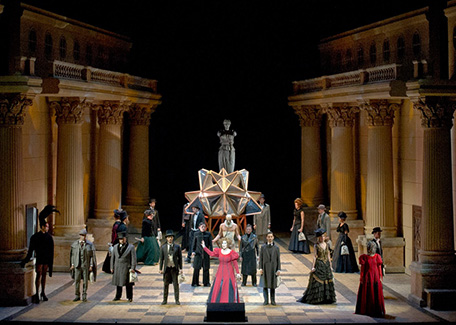DIRECTOR
> THEATRE | MUSICAL THEATRE | OPERA | SPECIAL PROJECTS
Beatrix Cenci
(2016)
Beatrix Cenci is a work of a unique darkness - perceptible not only in the work carried out by Ginastera on the musical level but also in the way in which the literary sources - Stendhal, Shelley, Artaud - are knotted in the libretto by William Shand & Alberto Girri.
Apparently simple in its dramaturgical structure, the work - in successive listening - awakened in me a very powerful imaginary around certain personal obsessions: ghosts, the subjection to the past, the irrevocable passage of time, death, violence, sexuality.
The challenge was to translate these obsessions into images so that - working on the timeline proposed by the work - the descent into hell that is for me Beatrix Cenci can be shared with the audience.
The work has the grammar of nightmare. And in that way of reading I concentrated: we present a nightmare: decided by moments, erratic by others. The scenario as the projection of the dreams and obsessions of Count Cenci - which is, for me, the great strength of the work: the body of violence, the body that commits the abuse, the body of hybris.
Beatrix Cenci is a tale of ghosts and is also a pornographic story and a gothic novel - with its lavish and decadent settings and its sick characters behind an obsession that, of course, always hides (or exhibits) the forbidden: incest, for example - and it is also a work about the law (as usual): about the weight that words has over people, about the violence that words exerts over bodies - it is, then, a work about this country: not because of the obvious but for what it hides. And Beatrix Cenci is, also, a story that is shelled in front of the astonished eyes of a child.
Alejandro Tantanian
-
Beatrix Cenci
Opera in two acts and fourteen scenes (1971)
Music by Alberto Ginastera
Libretto by William Shand and Alberto Girri based in “Italian Chronicles” by Stendhal and “Los Cenci” by Percy Bysshe Shelley -
With
Beatrix Cenci
Mónica Ferracani
Daniela Tabernig Second Cast -
Count Francisco Cenci
Victor Torres
Leonardo Estevez Second Cast -
Lucrezia
Alejandra Malvino
María Luján Mirabelli Segundo Elenco -
Bernardo
Florencia Machado
Rocío Arbizu Second Cast -
Orsino
Gustavo López Manzitti
Fernando Chalabe Second Cast -
Andrea
Mario De Salvo
Emiliano Bulacios Second Cast -
Giacomo
Alejandro Spies -
Three Guests
Sebastián Sorarrain, Iván Maier, Victor Castells -
Olimpio
Luis Alejandro Escaño -
Marzio
Ernesto Donegana -
Actors
Child
Dante Lombardi, Constantine Semka Boyko -
Count’s Bodyguards
Cristian Jensen, Pablo Pereyra, Matias Pisera -
Security
Bruno Améndola, Leonardo Giaimo -
Masters of Ceremony
Daniel Wendler, Marcela Arza, Francisco Andrade -
The Other Beatrix
Brenda Donadío -
The Other Count
Hermes Molaro -
Orgy
Masters
Cristian Jensen, Pablo Pereyra, Matías Pisera
Slave
Esteban Recagno
Cage
Lucía Rivero Bonet, Camilo Polotto, Juan Miño
Trio 1
Ernesto Donegana, Lucas Lagomarsino, Sebastián García
Trio 2
Antonella Saldico, Milagros Michael, Marcelino Fernandez
Trio 3
Rodolfo Opazo, Alejandro Escaño, Bruno Améndola
-
Guests
Dara Parpagnoli, Felipe Díaz, Malena Colombo, Nicolás Manservigi, Pablo Kopp, Esteban Pucheta -
Cook
Camilo Polotto -
Butler
Leonardo Giaimo -
Dogs
Marcelino Fernandez, Lucas Lagomarsino, Rodolfo Opazo, Bruno Amendola, Sebastián García -
Hairdressers
Felipe Díaz, Pablo Kopp -
Orquesta Estable del Teatro Colón
Coro Estable del Teatro Colón dirigido por Miguel Martínez -
Assistant to the Light Designer
Facundo David -
Assistant to the Set Designer
Martina Nosetto -
Assistant to the Costume Designer
César Taibo -
Assistant to the Stage Director
Mariana Ciolfi -
Video
Maxi Vecco -
Light Designer
David Seldes -
Set and Costume Designer
Oria Puppo -
Production
Teatro Colón -
Musical Direction
Guillermo Scarabino -
Stage Direction
Alejandro Tantanian -
Running time: 80 minutes
-
Premiere: March 15th, 2016, Teatro Colón, Buenos Aires, Argentina.
The celebrations for the centenary of the birth of Alberto Ginastera (1916-1983) coincide with the opening of the lyrical season: Beatrix Cenci, third and last opera completed by the great Argentine composer.
